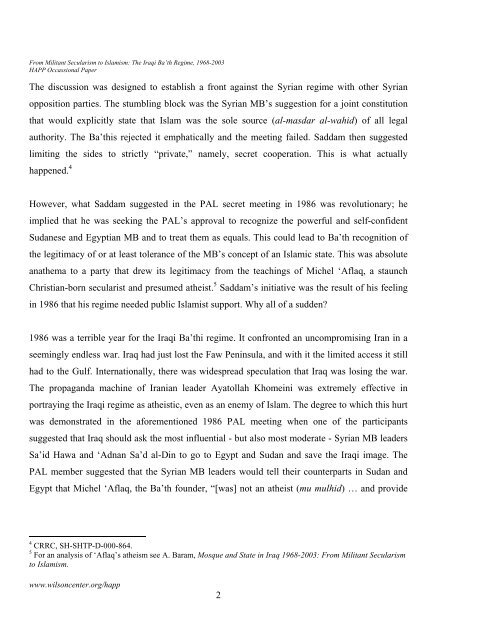From Militant Secularism to Islamism
From Militant Secularism to Islamism
From Militant Secularism to Islamism
Create successful ePaper yourself
Turn your PDF publications into a flip-book with our unique Google optimized e-Paper software.
<strong>From</strong> <strong>Militant</strong> <strong>Secularism</strong> <strong>to</strong> <strong>Islamism</strong>: The Iraqi Ba’th Regime, 1968-2003<br />
HAPP Occassional Paper<br />
The discussion was designed <strong>to</strong> establish a front against the Syrian regime with other Syrian<br />
opposition parties. The stumbling block was the Syrian MB’s suggestion for a joint constitution<br />
that would explicitly state that Islam was the sole source (al-masdar al-wahid) of all legal<br />
authority. The Ba’this rejected it emphatically and the meeting failed. Saddam then suggested<br />
limiting the sides <strong>to</strong> strictly “private,” namely, secret cooperation. This is what actually<br />
happened. 4<br />
However, what Saddam suggested in the PAL secret meeting in 1986 was revolutionary; he<br />
implied that he was seeking the PAL’s approval <strong>to</strong> recognize the powerful and self-confident<br />
Sudanese and Egyptian MB and <strong>to</strong> treat them as equals. This could lead <strong>to</strong> Ba’th recognition of<br />
the legitimacy of or at least <strong>to</strong>lerance of the MB’s concept of an Islamic state. This was absolute<br />
anathema <strong>to</strong> a party that drew its legitimacy from the teachings of Michel ‘Aflaq, a staunch<br />
Christian-born secularist and presumed atheist. 5 Saddam’s initiative was the result of his feeling<br />
in 1986 that his regime needed public Islamist support. Why all of a sudden?<br />
1986 was a terrible year for the Iraqi Ba’thi regime. It confronted an uncompromising Iran in a<br />
seemingly endless war. Iraq had just lost the Faw Peninsula, and with it the limited access it still<br />
had <strong>to</strong> the Gulf. Internationally, there was widespread speculation that Iraq was losing the war.<br />
The propaganda machine of Iranian leader Aya<strong>to</strong>llah Khomeini was extremely effective in<br />
portraying the Iraqi regime as atheistic, even as an enemy of Islam. The degree <strong>to</strong> which this hurt<br />
was demonstrated in the aforementioned 1986 PAL meeting when one of the participants<br />
suggested that Iraq should ask the most influential - but also most moderate - Syrian MB leaders<br />
Sa’id Hawa and ‘Adnan Sa’d al-Din <strong>to</strong> go <strong>to</strong> Egypt and Sudan and save the Iraqi image. The<br />
PAL member suggested that the Syrian MB leaders would tell their counterparts in Sudan and<br />
Egypt that Michel ‘Aflaq, the Ba’th founder, “[was] not an atheist (mu mulhid) … and provide<br />
4 CRRC, SH-SHTP-D-000-864.<br />
5 For an analysis of ‘Aflaq’s atheism see A. Baram, Mosque and State in Iraq 1968-2003: <strong>From</strong> <strong>Militant</strong> <strong>Secularism</strong><br />
<strong>to</strong> <strong>Islamism</strong>.<br />
www.wilsoncenter.org/happ<br />
2


